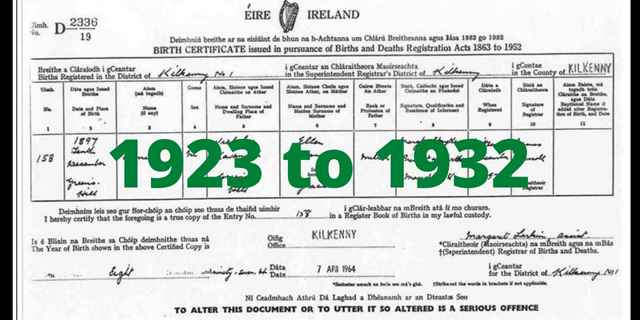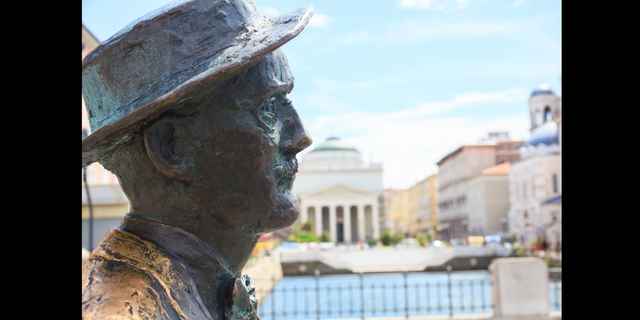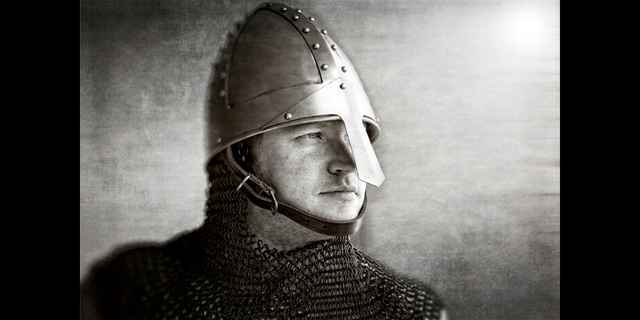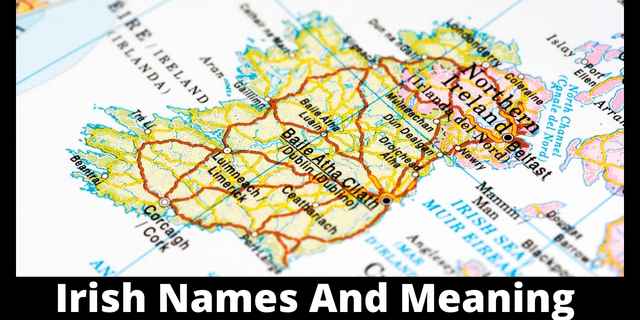This is going to be a short list as there are very few Irish last names that begin with J.
The reason is that the Gaelic language only has eighteen letters instead of twenty-six, and one of the missing letters is J.
However, there are a few names starting with J that entered Ireland from abroad and the holders grew in number. We’ll cover them here with their origins and meanings.
Irish Surnames Starting With J
We looked for names that appeared in the birth registrations in Ireland between 1923 and 1932.
The table below also has the number of bearers of the name in the 2010 U.S. census.
| Joyce | 1,302 Irish births from 1923-32 | 34,132 in the 2010 U.S. census |
| Jackson | 481 Irish births from 1923-32 | 708,099 in the 2010 U.S. census |
| Judge | 304 Irish births from 1923-32 | 10,453 in the 2010 U.S. census |
| Jeffers | 50 Irish births from 1923-32 | 17,455 in the 2010 U.S. census |
| Jeffares | 11 Irish births from 1923-32 | 203 in the 2010 U.S. census |
Wait, was there only five? Yes! And we looked hard.
Why take Irish birth registrations from 1923 to 1932?

The second column is the number of Irish birth registrations over ten years starting in 1923.
The reason I chose that start date was that the Republic of Ireland was established the previous year. Starting in 1923 excluded birth locations in Northern Ireland.
Otherwise, the number of English and Scottish names would take longer to filter out of this list.
Names in the U.S. census
Remember that many names have different origins and are from different regions.
One Jackson family may be the descendants of Irish ancestors while another may descend from English ancestors with very different origins.
Let’s run through the origins and meanings of this handful of monikers.
Joyce

James Joyce (1882-1941) was one of Ireland’s greatest writers. And Joyce is still quite a common name in the country.
The origins of the name are Norman.
The Norman name is derived from a personal (first) name of Joce or Josse. The meaning comes from an Old Breton word meaning “lord”.
It was popularized in the Middle Ages through the veneration of Saint Josse, a supposed brother of a seventh-century Breton king.
King Charlemagne was a fan and promoted a cult in the eighth century that had grown around the saint.
The name appeared in England after the Norman Conquest.
It would later spread to Ireland through or after the Anglo-Norman Invasion of the country in 1169. There are references to the name in 12th-century Irish manuscripts.

Gaelicization
As the Anglo-Normans settled in Ireland, later generations would sometimes change their names to a more Gaelic-sounding form. This is known as Gaelicization.
Without a “j” sound, the starting consonant changed to the English “sh” sound.
The Gaelic forms were Seóigh, Seoige, or Seóigheach.
Joyce Country
The name became particularly prevalent in Galway and Mayo in the province of Connacht in the west of the country.
There is a territory straddling the borders of both counties that is known as Joyce Country.
Two lakes form the boundaries of the territory which also contains low mountains. It’s a beautiful part of the world.
Jackson
This name is very common in England, Scotland, and Wales. It may have been brought to Ireland from Scotland.
The name means “son of Jack”, and Jack is a diminutive of John.
Judge

There was a sophisticated system of justice in ancient Ireland. Brehon law was considered by judges known as brehons.
The Gaelic name Mac an Bhreitheamhann means “son of the judge”. Under English rule, some families of this name changed it to the direct translation of Judge.
Others changed it to the English name Brown or Browne, because that sounds most like the Gaelic word.
This is an Anglicized form of the Gaelic name Ó hÉilidhe. I explain “Anglicization” more fully in a later section.
Jeffers and Jeffares
These names are likely to have been brought to Ireland from Scotland or England at some point.
They are considered to be variants of the name Jeffries. There are several theories about the origins of Jefferies. One is that it is a variant of Godfrey, which is a Germanic name meaning “God’s peace”.
More About The Anglicization Of Irish Surnames

You’ll find it easier to understand how Irish families changed their names with a bit more background.
The use of surnames in Ireland dates back to the tenth century. Children adopted the first name of their father and prefixed it with “Mac” or “O”, which means “son” and “descendent of”.
These names were in the Gaelic language.
In later centuries when Ireland was under British rule, the use of the Gaelic language was curbed.
This led to the Irish making their names look and sound more English i.e. Anglicization.
The simplest way was to drop the O and Mac in front of a name.
Another way was to pick the nearest sounding English name.
The third way was to pick an English name that has the same meaning as the Gaelic name. The two names may sound completely different.
Sources
- Irish Civil Birth Registrations
- Irish Names and Surnames by Reverend Patrick Woulfe
The Norman Conquest of William of Orange???
Might want to check your history book…
Lol, yep, that’s a face-palm.